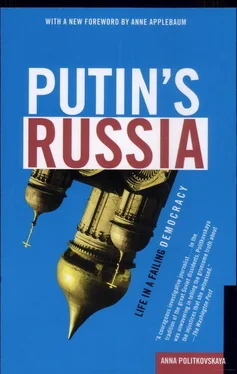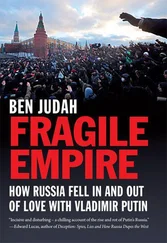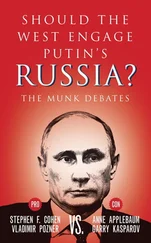The soldiers later insisted that nobody had stolen the FRLV. It was right there in its usual place in the divisional parking lot. The officers were just bored. They had been drinking for days, were probably feeling ill as a result and decided to divert themselves with a bit of bullying. It was not by any means the first time this sort of thing had occurred at the Kamyshin training ground, which has a bad reputation.
After the announcement, a first batch of soldiers was led into the officers’ tent: Sergeants Kutuzov and Krutov, Privates Generalov, Gursky, and Gritsenko. The others, who were ordered to wait outside, soon heard the cries and groans of their fellow soldiers. The officers were beating them. The first batch was thrown out of the tent. They told their comrades that the officers had beaten them on their buttocks and backs with the hafts of entrenching tools, and kicked them in the belly and the ribs. The description was unnecessary. The signs of the beatings were clearly visible on the soldiers’ bodies.
The officers announced that they would now take a break. The lieutenant colonel, two majors, three lieutenants, and one sublieutenant would be having dinner, and they informed the remaining soldiers that failure to confess voluntarily to having stolen the FRLV would result in being beaten in the same way as those now sprawled on the grass outside their tent.
Their announcement made, the officers departed to take soup.
And the soldiers? They walked out. They mutinied, choosing not to wait like sheep for the slaughter. They left the soldiers on sentry duty behind, since deserting your post is a criminal offense involving a court-martial and sentencing to a disciplinary battalion, and they also left Kutuzov, Krutov, Generalov, and Gritsenko, who were incapable of walking.
Forming a column, the soldiers marched out of the training ground toward Volgograd to get help.
It is a fair distance from Prudboy to Volgograd but the fifty-four soldiers marched the entire journey in an orderly manner, making no attempt to hide, on the edge of a busy highway along which officers of the Twentieth Division were traveling to and fro. Not one vehicle stopped. No one thought to ask where the soldiers were going without an officer, which is against army regulations.
The soldiers marched until dark. They lay down to sleep in the strip of woodland beside the highway. No one came looking for them, despite the fact that when the lieutenant colonel, two majors, three lieutenants, and one sublieutenant emerged from the dining room after finishing their meal, they discovered a marked thinning of the numbers of the Second Section. They had almost no one left to command.
The officers went to bed, having no idea of the whereabouts of the soldiers for whom, by law, they were personally responsible, but knowing full well that in Russia no officer is ever punished for something that has happened to a private.
Early on the morning of September 9, the fifty-four soldiers set off again along the highway. And again army officers drove insouciantly by.
This detachment of soldiers blessed with self-respect was on the march for one and a half days, and nobody from the Twentieth Division missed them. On the evening of September 9, they marched quite openly into Volgograd. They were observed by the police, but still nobody took any interest.
The soldiers marched to the city center.
“It was about six in the evening, and we were preparing to go home when the telephone rang suddenly. ‘Are you still open? May we come to see you?”’ Tatyana Zozulenko, director of the Volgograd Province Mothers’ Rights organization, tells me. “I said, ‘Come right in.’ Of course, there was no way I was expecting what happened next. Four young privates came into our small room and said there were fifty-four of them. I asked where the others were, and the boys led me down to the little basement of our own building. The rest were all standing there. I have worked in this organization for eleven years but had never seen anything quite like that before. The first thing I worried about was where we were going to put them all. It was already evening. We asked them whether they had eaten. ‘No,’ they replied, ‘not since yesterday.’ Our members ran off to buy as much bread and milk as they could. The boys fell on the food like hungry dogs, but that was something we are used to. Soldiers are very badly fed in their units. They are chronically undernourished.
“When they had eaten, I asked, ‘What do you want the result of your action to be?’ They replied, ‘We want officers who beat up soldiers to be punished.’ We decided to put them up for the night in Mothers’ Rights, all of them in together on the floor, to give us time to sleep on it. First thing in the morning we would go to the garrison prosecutor’s office. I locked the door and went home. I live nearby and thought I could come around quickly if I was needed. At eleven that evening I phoned them, but nobody answered. I thought they must just be tired, probably asleep or afraid of answering the phone. I was awakened at two in the morning by our lawyer Sergey Semushin. He said someone who hadn’t identified himself had called to ask him to ‘secure his premises.’ I was around there within minutes. There were small military vehicles outside with officers in them. They did not introduce themselves. The soldiers had disappeared. I asked the officers where they were and got no reply.”
The Mothers’ Rights workers also discovered that their computer system, with information about crimes committed in the Twentieth Division, had been broken into and stripped. They found a note under the carpet from a soldier saying they didn’t know where they were being taken; they were being beaten and needed help.
There is a little more to add. The officers at the training ground “missed” their soldiers only after being telephoned by their superiors. This was late in the evening of September 9, after Tatyana Zozulenko had contacted journalists in Volgograd and information about the AWOL soldiers had first gone out on the airwaves. The regional staff headquarters naturally demanded an explanation from the officers. Then, during the night, vehicles drove up to Mothers’ Rights, and all fifty-four soldiers were removed to the guardhouse in the military commandant’s office. They were then returned to their unit under the supervision of the very officers whose bullying had made the soldiers leave the training ground in the first place. Zozulenko asked Volgograd garrison prosecutor Chernov, whose duty it is to ensure that the law is upheld in the garrison’s units, why he had returned the soldiers to the Twentieth Division, and he replied, without flinching, “Because these are our soldiers.”
That’s the key phrase in the saga of the fifty-four. “Our soldiers” effectively means “our slaves.” Everything remains just as it always has been in the Russian army, where a perverse understanding of an officer’s honor means the negligible value of the life and dignity of any private. The march from the training ground was the result of the abhorrent tradition that a soldier is an officer’s slave. An officer can treat a soldier exactly as he pleases. It also stemmed from the sad fact that civilian control of army procedures, about which much was said in the Yeltsin years, and a draft law was even written, is non-existent. President Putin shares the army’s view of its officers’ rights and considers civilian monitoring of the armed forces inappropriate.
Underlying this story is the fact that the Twentieth Division—also called the Rokhlin Division after its commander, Lev Rokhlin, a hero of the first Chechen war and today a deputy of the state duma—and particularly Unit 20004, have long been notorious in Volgograd, and indeed throughout Russia.
Читать дальше





![Stephan Orth - Behind Putin's Curtain - Friendships and Misadventures Inside Russia [aka Couchsurfing in Russia]](/books/415210/stephan-orth-behind-putin-s-curtain-friendships-a-thumb.webp)






